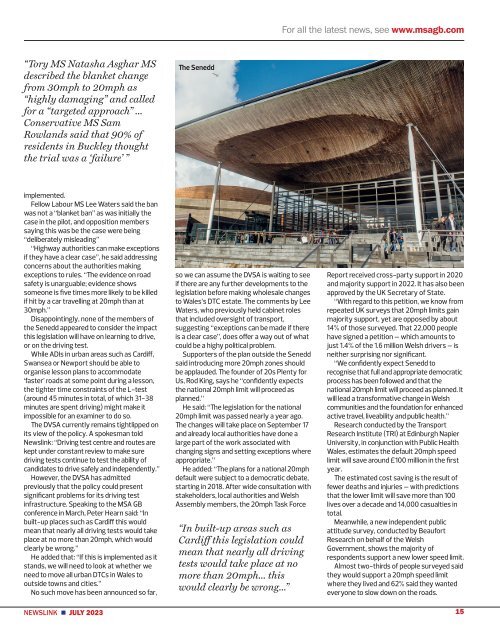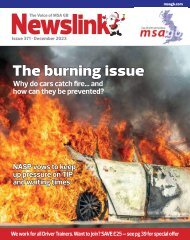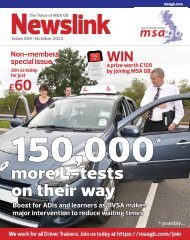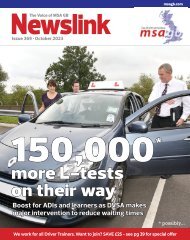Newslink July 01-40
Create successful ePaper yourself
Turn your PDF publications into a flip-book with our unique Google optimized e-Paper software.
For all the latest news, see www.msagb.com<br />
“Tory MS Natasha Asghar MS<br />
described the blanket change<br />
from 30mph to 20mph as<br />
“highly damaging” and called<br />
for a “targeted approach” ...<br />
Conservative MS Sam<br />
Rowlands said that 90% of<br />
residents in Buckley thought<br />
the trial was a ‘failure’ ”<br />
The Senedd<br />
implemented.<br />
Fellow Labour MS Lee Waters said the ban<br />
was not a “blanket ban” as was initially the<br />
case in the pilot, and opposition members<br />
saying this was be the case were being<br />
“deliberately misleading”<br />
“Highway authorities can make exceptions<br />
if they have a clear case”, he said addressing<br />
concerns about the authorities making<br />
exceptions to rules. “The evidence on road<br />
safety is unarguable; evidence shows<br />
someone is five times more likely to be killed<br />
if hit by a car travelling at 20mph than at<br />
30mph.”<br />
Disappointingly, none of the members of<br />
the Senedd appeared to consider the impact<br />
this legislation will have on learning to drive,<br />
or on the driving test.<br />
While ADIs in urban areas such as Cardiff,<br />
Swansea or Newport should be able to<br />
organise lesson plans to accommodate<br />
‘faster’ roads at some point during a lesson,<br />
the tighter time constraints of the L-test<br />
(around 45 minutes in total, of which 31-38<br />
minutes are spent driving) might make it<br />
impossible for an examiner to do so.<br />
The DVSA currently remains tightlipped on<br />
its view of the policy. A spokesman told<br />
<strong>Newslink</strong>: “Driving test centre and routes are<br />
kept under constant review to make sure<br />
driving tests continue to test the ability of<br />
candidates to drive safely and independently.”<br />
However, the DVSA has admitted<br />
previously that the policy could present<br />
significant problems for its driving test<br />
infrastructure. Speaking to the MSA GB<br />
conference in March, Peter Hearn said: “In<br />
built-up places such as Cardiff this would<br />
mean that nearly all driving tests would take<br />
place at no more than 20mph, which would<br />
clearly be wrong.”<br />
He added that: “If this is implemented as it<br />
stands, we will need to look at whether we<br />
need to move all urban DTCs in Wales to<br />
outside towns and cities.”<br />
No such move has been announced so far,<br />
so we can assume the DVSA is waiting to see<br />
if there are any further developments to the<br />
legislation before making wholesale changes<br />
to Wales’s DTC estate. The comments by Lee<br />
Waters, who previously held cabinet roles<br />
that included oversight of transport,<br />
suggesting “exceptions can be made if there<br />
is a clear case”, does offer a way out of what<br />
could be a highy political problem.<br />
Supporters of the plan outside the Senedd<br />
said introducing more 20mph zones should<br />
be applauded. The founder of 20s Plenty for<br />
Us, Rod King, says he “confidently expects<br />
the national 20mph limit will proceed as<br />
planned.”<br />
He said: “The legislation for the national<br />
20mph limit was passed nearly a year ago.<br />
The changes will take place on September 17<br />
and already local authorities have done a<br />
large part of the work associated with<br />
changing signs and setting exceptions where<br />
appropriate.”<br />
He added: “The plans for a national 20mph<br />
default were subject to a democratic debate,<br />
starting in 2<strong>01</strong>8. After wide consultation with<br />
stakeholders, local authorities and Welsh<br />
Assembly members, the 20mph Task Force<br />
“In built-up areas such as<br />
Cardiff this legislation could<br />
mean that nearly all driving<br />
tests would take place at no<br />
more than 20mph... this<br />
would clearly be wrong...”<br />
Report received cross-party support in 2020<br />
and majority support in 2022. It has also been<br />
approved by the UK Secretary of State.<br />
“With regard to this petition, we know from<br />
repeated UK surveys that 20mph limits gain<br />
majority support, yet are opposed by about<br />
14% of those surveyed. That 22,000 people<br />
have signed a petition – which amounts to<br />
just 1.4% of the 1.6 million Welsh drivers – is<br />
neither surprising nor significant.<br />
“We confidently expect Senedd to<br />
recognise that full and appropriate democratic<br />
process has been followed and that the<br />
national 20mph limit will proceed as planned. It<br />
will lead a transformative change in Welsh<br />
communities and the foundation for enhanced<br />
active travel, liveability and public health.”<br />
Research conducted by the Transport<br />
Research Institute (TRI) at Edinburgh Napier<br />
University, in conjunction with Public Health<br />
Wales, estimates the default 20mph speed<br />
limit will save around £100 million in the first<br />
year.<br />
The estimated cost saving is the result of<br />
fewer deaths and injuries – with predictions<br />
that the lower limit will save more than 100<br />
lives over a decade and 14,000 casualties in<br />
total.<br />
Meanwhile, a new independent public<br />
attitude survey, conducted by Beaufort<br />
Research on behalf of the Welsh<br />
Government, shows the majority of<br />
respondents support a new lower speed limit.<br />
Almost two-thirds of people surveyed said<br />
they would support a 20mph speed limit<br />
where they lived and 62% said they wanted<br />
everyone to slow down on the roads.<br />
NEWSLINK n JULY 2023 15

















